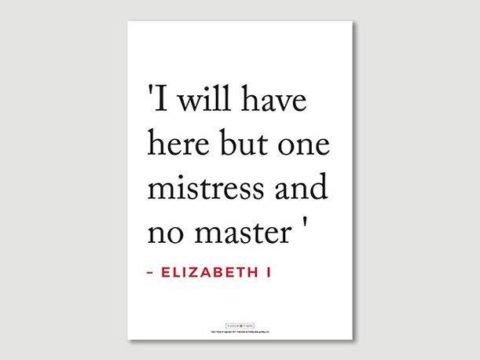William Shakespeare: Life Story
Chapter 4 : Gentleman
Shakespeare’s growing success led him to reopen his father’s old application for a coat of arms. Sadly, his dreams of dynasty died in August 1595 along with his 11-year-old son Hamnet. We know so little of Shakespeare’s actual movements that his presence in Stratford at the time for the child’s funeral can only be surmised. The grant on 20 October 1596 of the coat of arms must have seemed a sad irony. The Shakespeares, John, William and his surviving brothers, could now be described in documents and referred to as ‘gentlemen’. Although that seems a mere curiosity in the 21st century, at the time it was an important step up in the social hierarchy.
Another example of Shakespeare’s growing prosperity is the purchase, in 1597, of a house called New Place in Stratford for the sum of £60 – it was a large property with a 60 foot frontage, two gardens, two orchards and barns. He may have now been in a relatively comfortable financial position, but he still regularly failed to pay his taxes, being found guilty of failing to pay a 5s tax in 1597 and a further tax in 1598.
Despite the handsome new home in Stratford, Shakespeare continued to live in London, as a member of the Lord Chamberlain’s players. There was a move to close the playhouses again when Ben Jonson, an up-and-coming new dramatist, produced jointly with Thomas Nash, a satire called the Isle of Dogs. This upset the City Corporation to such an extent that it demanded that playhouses be not only closed but demolished. Fortunately, tempers cooled and theatres were reopened.Shakespeare and Johnson appear to have become friends around this time.
In 1598, in a sign of growing popularity, Shakespeare’s plays began to appear in print under his own name, rather than anonymously as had previously been the case. Richard II, Richard III, soon followed by Romeo and Juliet.
The lease of the theatre that the Lord Chamberlain’s Men used was in the name of James Burbage. It was due to expire on 13 April 1597 and Burbage tried frantically to negotiate a new lease from the freeholder, Giles Allen. Unable to agree terms, Burbage began to look for another site. Initially he believed that of the old Blackfriars monastery might prove suitable but the local residents protested to the Privy Council, and the Crown, which owned the property, declined to grant the lease. Whilst negotiations were continuing Burbage died, leaving the matter in the hands of his sons and the other members of the Company.
The Company concluded that the best option would be to move the theatre – lock, stock and barrel to a new site in Southwark, so the structure, which was owned by the Company, was dismantled and taken across the river. This action gave rise to a series of lawsuits with which Burbage’s sons were harassed by over the following months.
By 16 May 1599, the Globe Theatre had been born. With an audience capacity of some 2,000 to 3,000, it proved to be rather a money-spinner. Shakespeare initially owned 10%, a stake which went up to 12% when Will Kemp left. Presumably in order to be closer to his investment and his place of work, Shakespeare himself now moved to the south side of the river and began his most prolific period of writing. He completed Henry V in time for it to probably have been the opening play at the Globe, followed up by Julius Caesar by September 1598 as well as Much Ado About Nothing and As you Like It in a similar period.
The departure of Kemp from the company, apparently unhappy with the way that traditional slapstick comedy was being replaced by more subtle humour of the Italian style, influenced Shakespeare by allowing him to write parts for fools which were more complex - the fools of the later plays are cast in the role of ironical observers, speaking truth to power.





